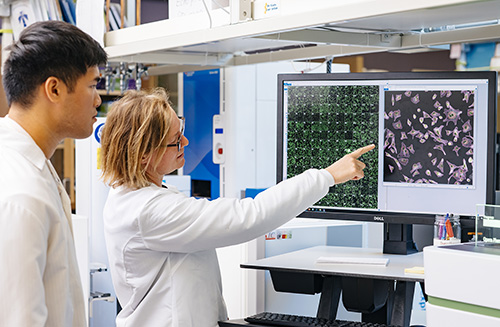Campus News
UCSC Chemical Screening Center symposium features drug discovery talks
The center will hold a Grand Reopening Celebration and Research Symposium on Friday, May 5, marking a major upgrade with new state-of-the-art equipment.

2022, research, UCSC

Since 2007, the UC Santa Cruz Chemical Screening Center has been an important campus facility both for basic science research and for drug discovery efforts to find new compounds for therapeutic uses. Over the past two years, with major funding from the National Institutes of Health, the center has installed new state-of-the-art equipment, substantially increasing its screening capabilities and level of automation.
The revamped facilities of the UCSC Chemical Screening Center will be highlighted at the center’s Grand Reopening Celebration and Research Symposium on Friday, May 5, at the University Center.
The keynote speakers will be Maureen Hillenmeyer, founder and CEO of the biotechnology company Hexagon Bio, and Michelle Arkin, distinguished professor and chair of pharmaceutical chemistry at UC San Francisco and director of the UCSF Small Molecule Discovery Center. The event will also include talks and poster presentations by UCSC faculty, staff scientists, postdocs, and students who are using the facility in their research.
“With all the new equipment installed and research activity ramping up, it’s a perfect time to mark the beginning of a new phase for the Chemical Screening Center,” said Scott Lokey, professor of chemistry and biochemistry and faculty director of the center. “We’ll be able to hear from people who are using it and getting new results.”
As part of the upgrade, the center moved to a new, larger space on the fourth floor of the Physical Sciences Building. The new infrastructure includes high-end robotic equipment for liquid handling and high-throughput sample processing, and an extremely fast high-resolution confocal microscope to acquire high-content image data for rapid screening of live cells.
“We can screen up to 200,000 samples per day, and the confocal microscope is so fast it can collect terabytes of image data per day,” said Beverley Rabbitts, the center’s director of operations.
Using specialized bioinformatics software to analyze the image data, researchers can screen thousands of compounds to detect subtle effects on cells and identify mechanisms of action that could lead to the development of a new drug.
In addition to the $2 million NIH instrumentation grant, the UCSC campus provided $100,000 for the purchase of new libraries of chemical compounds for screening, including a library of 64,000 synthetic molecules selected for chemical diversity and drug-like properties. The center also provides access to libraries developed at UCSC that are available nowhere else, including Lokey’s library of cyclic peptides and libraries of complex natural products isolated by the laboratories of Professors Phil Crews and John MacMillan.
Another powerful library of more than 8,000 bioactive compounds includes drugs already approved by the Food and Drug Administration. “There’s a lot of interest in repurposing existing drugs, so you can screen these compounds against a cancer cell line, for example, and if you find a hit you don’t have to go through all the clinical development that would be required for a new compound,” Lokey explained.
Rabbitts provides one-on-one training for students and other new users of the center’s facilities. Lokey said the focus on training sets the UCSC center apart from other screening centers.
“It’s valuable experience for the students, and the symposium will give them an opportunity to showcase what they’ve been doing,” he said.
Support for the symposium is provided by industry sponsors PerkinElmer and Agilent BioTek, and by the UCSC Office of Research, Division of Physical and Biological Sciences, Department of Chemistry & Biochemistry, Department of Molecular, Cellular, and Developmental Biology, Department of Microbiology and Environmental Toxicology, and the Biomolecular Engineering Department within Baskin Engineering.
The May 5 event begins at 10:30 a.m. For additional information, contact Beverley Rabbitts at brabbitt@ucsc.edu.